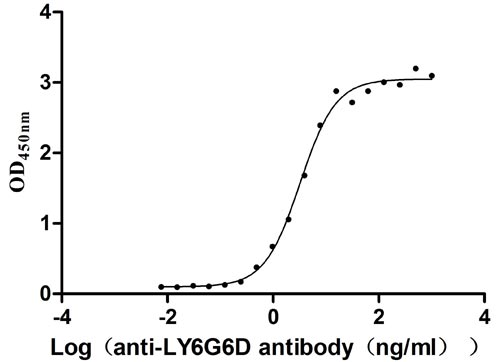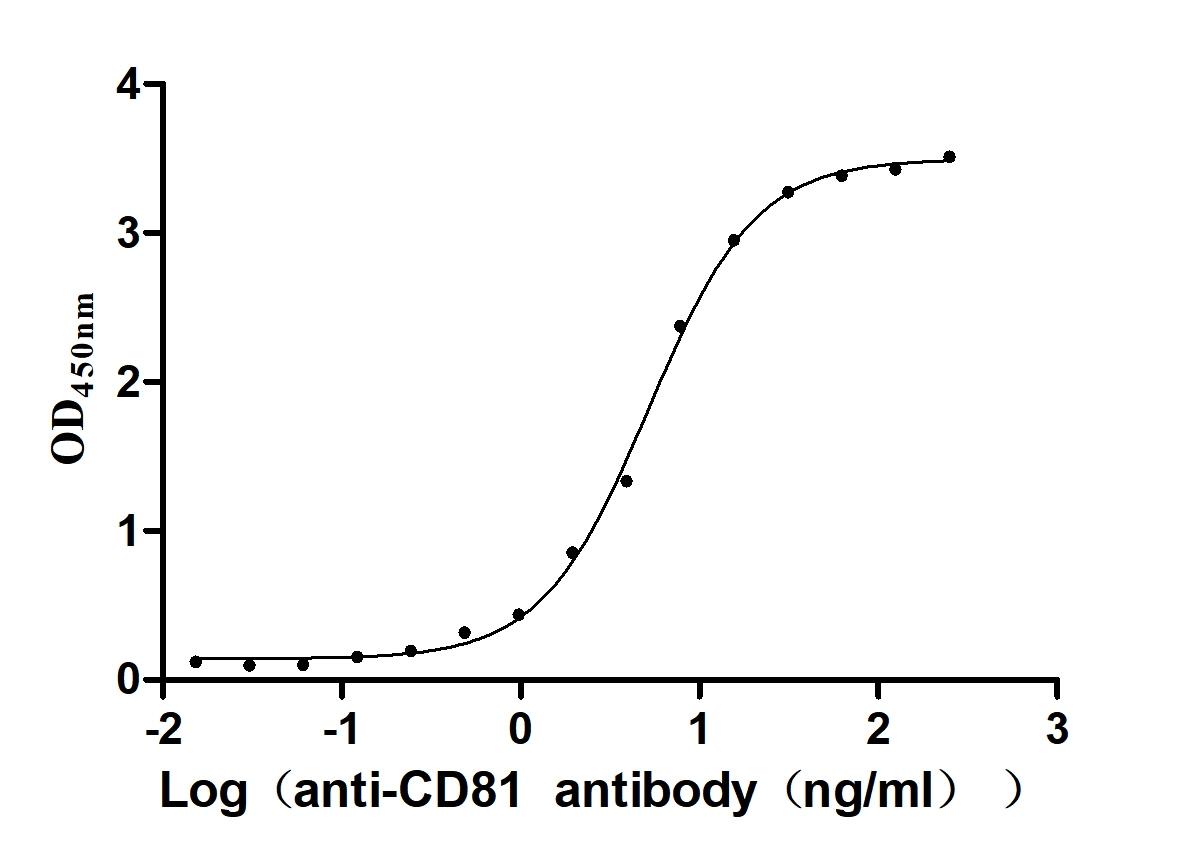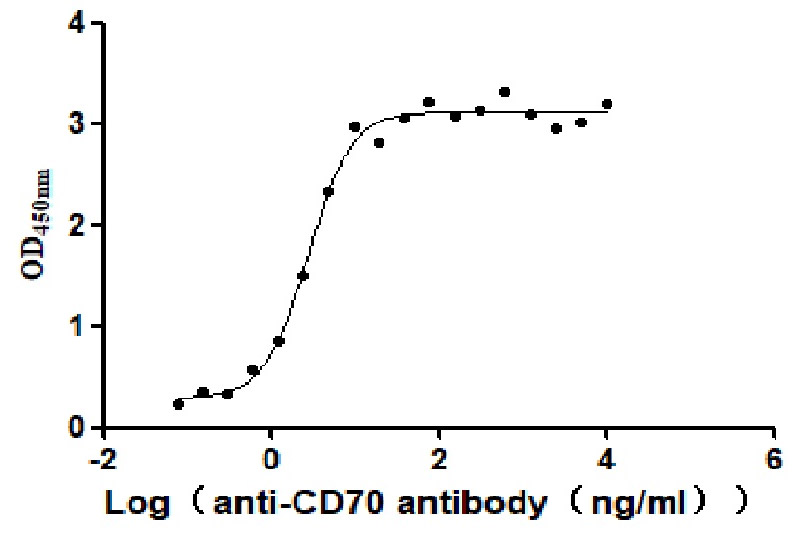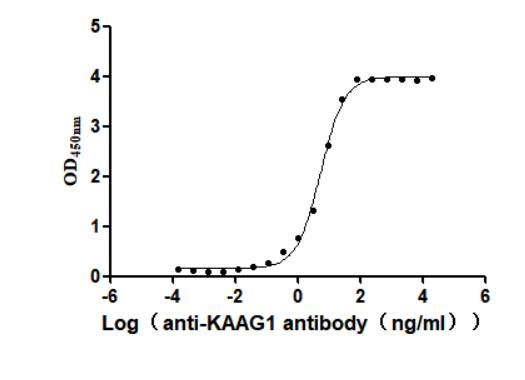Recombinant Human Potassium voltage-gated channel subfamily A member 5 (KCNA5)
-
货号:CSB-CF012010HU
-
规格:
-
来源:in vitro E.coli expression system
-
其他:
产品详情
-
基因名:KCNA5
-
Uniprot No.:
-
别名:KCNA5; Potassium voltage-gated channel subfamily A member 5; HPCN1; Voltage-gated potassium channel HK2; Voltage-gated potassium channel subunit Kv1.5
-
种属:Homo sapiens (Human)
-
蛋白长度:Full length protein
-
表达区域:1-246
-
氨基酸序列MEIALVPLENGGAMTVRGGDEARAGCGQATGGELQCPPTAGLSDGPKEPAPKGRGAQRDADSGVRPLPPLPDPGVRPLPPLPEELPRPRRPPPEDEEEEGDPGLGTVEDQALGTASLHHQRVHINISGLRFETQLGTLAQFPNTLLGDPAKRLRYFDPLRNEYFFDRNRPSFDGILYYYQSGGRLRRPVNVSLDVFADEIRFYQLGDEAMERFREDEGFIKEEEKPLPRNEFQRQVWLIFEYPESS
Note: The complete sequence including tag sequence, target protein sequence and linker sequence could be provided upon request. -
蛋白标签:N-terminal 10xHis-tagged
-
产品提供形式:Liquid or Lyophilized powder
Note: We will preferentially ship the format that we have in stock, however, if you have any special requirement for the format, please remark your requirement when placing the order, we will prepare according to your demand. -
缓冲液:Lyophilized from Tris/PBS-based buffer, 6% Trehalose, pH 8.0
-
储存条件:Store at -20°C/-80°C upon receipt, aliquoting is necessary for mutiple use. Avoid repeated freeze-thaw cycles.
-
保质期:The shelf life is related to many factors, storage state, buffer ingredients, storage temperature and the stability of the protein itself.
Generally, the shelf life of liquid form is 6 months at -20°C/-80°C. The shelf life of lyophilized form is 12 months at -20°C/-80°C. -
货期:Basically, we can dispatch the products out in 1-3 working days after receiving your orders. Delivery time may differ from different purchasing way or location, please kindly consult your local distributors for specific delivery time.Note: All of our proteins are default shipped with normal blue ice packs, if you request to ship with dry ice, please communicate with us in advance and extra fees will be charged.
-
注意事项:Repeated freezing and thawing is not recommended. Store working aliquots at 4°C for up to one week.
-
Datasheet & COA:Please contact us to get it.
相关产品
靶点详情
-
功能:Voltage-gated potassium channel that mediates transmembrane potassium transport in excitable membranes. Forms tetrameric potassium-selective channels through which potassium ions pass in accordance with their electrochemical gradient. The channel alternates between opened and closed conformations in response to the voltage difference across the membrane. Can form functional homotetrameric channels and heterotetrameric channels that contain variable proportions of KCNA1, KCNA2, KCNA4, KCNA5, and possibly other family members as well; channel properties depend on the type of alpha subunits that are part of the channel. Channel properties are modulated by cytoplasmic beta subunits that regulate the subcellular location of the alpha subunits and promote rapid inactivation. Homotetrameric channels display rapid activation and slow inactivation. May play a role in regulating the secretion of insulin in normal pancreatic islets. Isoform 2 exhibits a voltage-dependent recovery from inactivation and an excessive cumulative inactivation.
-
基因功能参考文献:
- Molecular dynamics simulations are employed to determine the inhibitory mechanisms of three drugs, 5-(4-phenoxybutoxy)psoralen (PAP-1), vernakalant, and flecainide, on the voltage-gated K(+) channel Kv1.5, a target for the treatment of cardiac arrhythmia. PMID: 29652491
- This study adds insights to the functional impact of KCNA5 mutations in modulating atrial contractile functions. PMID: 28803858
- In addition, as IKur is an atrial-specific channel and a number of IKur-selective blockers have been developed as anti-AF agents, this study also helps to understand some contradictory results on both pro- and anti-arrhythmic effects of blocking IKur. PMID: 28622331
- our finding indicated that KCNA5 protein may interact with Cav-1, thereby contributing to the proliferation and early transformation of mammary cells. PMID: 27075359
- Putative binding sites for arachidonic acid on the human cardiac Kv 1.5 channel PMID: 26292661
- Studies demonstrate that DNA hypermethylation contributes to epigenetic repression of the KCNA5 locus and that the resulting suppression of the Kv1.5 ion channel supports cancer cell proliferation. PMID: 26573141
- Kv1.5 expression is increased in osteosarcoma cells and tissues and shRNA mediated silencing of Kv1.5 results in cell proliferation inhibition, cell cycle arrest, and induces cell apoptosis. PMID: 26569226
- Direct interaction with specific amino acids underlies the blocking action of propofol on voltage-gated hKv1.5 channel. PMID: 26256861
- demonstrate that PK treatment cleaved mature membrane-bound (75kDa) Kv1.5 channels at a single locus in the S1-S2 linker, producing 42-kDa N-terminal fragments and 33-kDa C-terminal fragments PMID: 26874203
- These results indicate that CHIP decreases the Kv1.5 protein level and functional channel by facilitating its degradation in concert with chaperone Hsc70 PMID: 26232501
- The expression of Kv1.5 channel protein changes with atrial fibrillation but not with age, rheumatic heart diseases, and sex in atrial fibrillation. PMID: 25918274
- One KCNA5 variant, H463R, was a novel mutation; the histidine at codon 463 is located in the S5-pore loop, in the vicinity of the pore of KV1.5 subunit. The other variant, T527M, showed a gain-of-function effect with an enhanced steady-state activation. PMID: 26129877
- The KCNA5 promoter is marked in cancer cells with PcG-dependent chromatin repressive modifications that increase in hypoxia. PMID: 25435365
- Mutations in KCNA5 gene is not associated with pulmonary arterial hypertension. PMID: 24936649
- Protein kinase C inhibition results in a Kv 1.5 and Kv beta 1.3 pharmacology closer to Kv 1.5 channels PMID: 24946104
- Data do not indicate an important role of potassium voltage-gated channel shaker-related subfamily member 5 (KCNA5) as a sclerosis (SSc)-susceptibility factor or as a pulmonary arterial hypertension (PAH)-development genetic marker for SSc patients. PMID: 23270786
- These results indicate that low temperature exposure stabilizes the protein in the cellular organelles or on the plasma membrane, and modulates its maturation and trafficking, thus enhancing the currents of hKv1.5 and its trafficking defect mutants. PMID: 24663680
- Kv1.5 is a determinant of human B cell proliferation and migration, thereby identifying this channel as a new target for immunomodulation. PMID: 23847097
- Results identified gain and loss of function mutations which lead to increased and decreased potassium currents enhancing AF. PMID: 23264583
- AMPK is a potent regulator of Kv1.5. AMPK inhibits Kv1.5 presumably in part by activation of Nedd4- 2 with subsequent clearance of channel protein from the cell membrane. PMID: 23221389
- Incretin regulation of beta-cell function involves the acetylation of Kv1.5. PMID: 23390957
- Kv1.5 may play an important role in oxidative vascular endothelial injury PMID: 23185428
- Ethanol prologned the action potential duration in isolated myocardium, which may be due to inhibition of Kv1.5 channel currents. PMID: 21681339
- The experiments disclose a completely novel function of beta-catenin, i.e. the regulation of Kv1.5 channel activity. PMID: 22166221
- In order to substantiate a possible relation between K(v1.5) and FHL1C, a pull-down assay was performed. PMID: 22053194
- Our data implicate abnormal atrial repolarization control due to variable TK signaling as a mechanism in familial AF and thereby suggest a role for modulation of this pathway in AF and its treatment. PMID: 20638934
- In Kv1.5 H+ and Ni2+ differentially enhance a slow inactivation process that involves at least two inactivated states and that resting inactivation is probably a close variant of slow inactivation. PMID: 20581043
- an association was found solely for Pulmonary arterial hypertension associated with Systemic Sclerosis in KCNA5 ((potassium voltage-gated channel subfamily A member 5) rs10744676 variants PMID: 20556823
- Kv1.5 channel is blocked by diphenyl phosphine oxide-1 PMID: 20184887
- KCNA5 T527M mutation exerted a predominant negative effect on potassium currents but no effect on the subcellular location of the encoded ion channel. PMID: 20646426
- Biolistically introduced exogenous voltage-gated potassium channel, Kv1.5, is functional and, like endogenous Kv1.5, localizes to the intercalated disc, where it is expressed at the surface of that structure. PMID: 20357183
- Anandamide structure may a determinant of cannabinoid receptor-independent modulation. PMID: 20133392
- Data support a role for the T1 domain in channel kinetics as well as in KCNA5 channel subcellular localization. PMID: 20018952
- Overexpression of Kv1.5 is associated with cancer. PMID: 20025600
- In the absence of potassium ion, significant N-methyl-D-glucamine (NMDG)-positive currents could be recorded from human embryonic kidney cells expressing Kv3.1 or Kv3.2b channels and Kv1.5 Arg487Tyr/Val, but not wild-type channels. PMID: 19332619
- These findings expand the spectrum of mutations in KCNA5 linked to atrial fibrillation (AF) and provide new insight into the molecular mechanism involved in AF. PMID: 19343045
- characterization of a truncated form of Kv1.5 PMID: 12021261
- Modulation by protein kinase C activation: role of the Kvbeta1.2 subunit. PMID: 12130714
- co-localization of Kv1.5 with PSD95 at the cell surface is similarly independent of the canonical PDZ-binding motif PMID: 12435606
- Reduction in the activation energy for the inactivation transition from the open state underlies the inhibition of hKv1.5 Na(+) current at low pH. PMID: 12601085
- Kv1.5 potassium channel mRNA expression correlates with glioma entities and malignancy grades; expression is high in astrocytomas, moderate in oligodendrogliomas, and low in glioblastomas. PMID: 12850541
- multiple isoforms of SAP97 were identifed in human heart atrium specimens; isoforms were found to co-immunoprecipiate with hKv1.5; isoforms were found to have distinct effect on hKv1.5 current and spatial channel organization PMID: 12970345
- the destabilization or bending of the S6 alpha-helix of KV1.5 caused by the PXP motif apparently creates a flexible "hinge" that allows movement of the lower S6 segment during channel gating and opening PMID: 13679372
- No electrical remodeling is evident in Kv1.5DN-expressing ventricular myocytes, and the (Kv1.5DN-induced) elimination of IK,slow1 does not result in spontaneous ventricular arrhythmias. PMID: 14527939
- an examination of the effect of K channel blocker S0100176) on the structure of the Kv1.5 channel PMID: 14578345
- Overexpression of the human KCNA5 gene increases K+ currents (i.e., K+ efflux or loss), accelerates apoptotic volume decrease (AVD), increases caspase-3 activity, and induces apoptosis PMID: 15140747
- Heterologously expressed human pulmonary arterial smooth muscle cells (PASMC) Kv1.5 generated an O2- and correolide-sensitive I(K) like that in resistance PASMCs. PMID: 15217912
- There is a central role for developmentally regulated ductus arteriosus SMC O2-sensitive Kv channels in the functional closure of the DA. PMID: 15353504
- This suggests that for Kv channels, the coupling between voltage sensing and gating reflects primarily an intrasubunit interaction. PMID: 15623896
- P. 142: "An aligment of KCNA5 among human, mouse, and rat shows 86% amino acid identity, and no monogenicc human arrhythmia syndrome has been linked to KCNA5" PMID: 15735608
显示更多
收起更多
-
相关疾病:Atrial fibrillation, familial, 7 (ATFB7)
-
亚细胞定位:Cell membrane; Multi-pass membrane protein.
-
蛋白家族:Potassium channel family, A (Shaker) (TC 1.A.1.2) subfamily, Kv1.5/KCNA5 sub-subfamily
-
组织特异性:Pancreatic islets and insulinoma.
-
数据库链接:
HGNC: 6224
OMIM: 176267
KEGG: hsa:3741
STRING: 9606.ENSP00000252321
UniGene: Hs.150208
Most popular with customers
-
Recombinant Human T-cell antigen CD7 (CD7), partial (Active)
Express system: Mammalian cell
Species: Homo sapiens (Human)
-
Recombinant Human Nectin-4 (NECTIN4), partial (Active)
Express system: Mammalian cell
Species: Homo sapiens (Human)
-
Recombinant Human Microtubule-associated protein tau (MAPT) (Active)
Express system: Mammalian cell
Species: Homo sapiens (Human)
-
Recombinant Human Lymphocyte antigen 6 complex locus protein G6d (LY6G6D) (Active)
Express system: Yeast
Species: Homo sapiens (Human)
-
Recombinant Human CD81 antigen (CD81), partial (Active)
Express system: Mammalian cell
Species: Homo sapiens (Human)
-
Recombinant Human CD70 antigen (CD70), partial (Active)
Express system: Mammalian cell
Species: Homo sapiens (Human)
-
Recombinant Human Kidney-associated antigen 1(KAAG1) (Active)
Express system: Baculovirus
Species: Homo sapiens (Human)


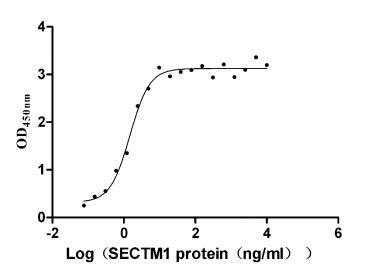
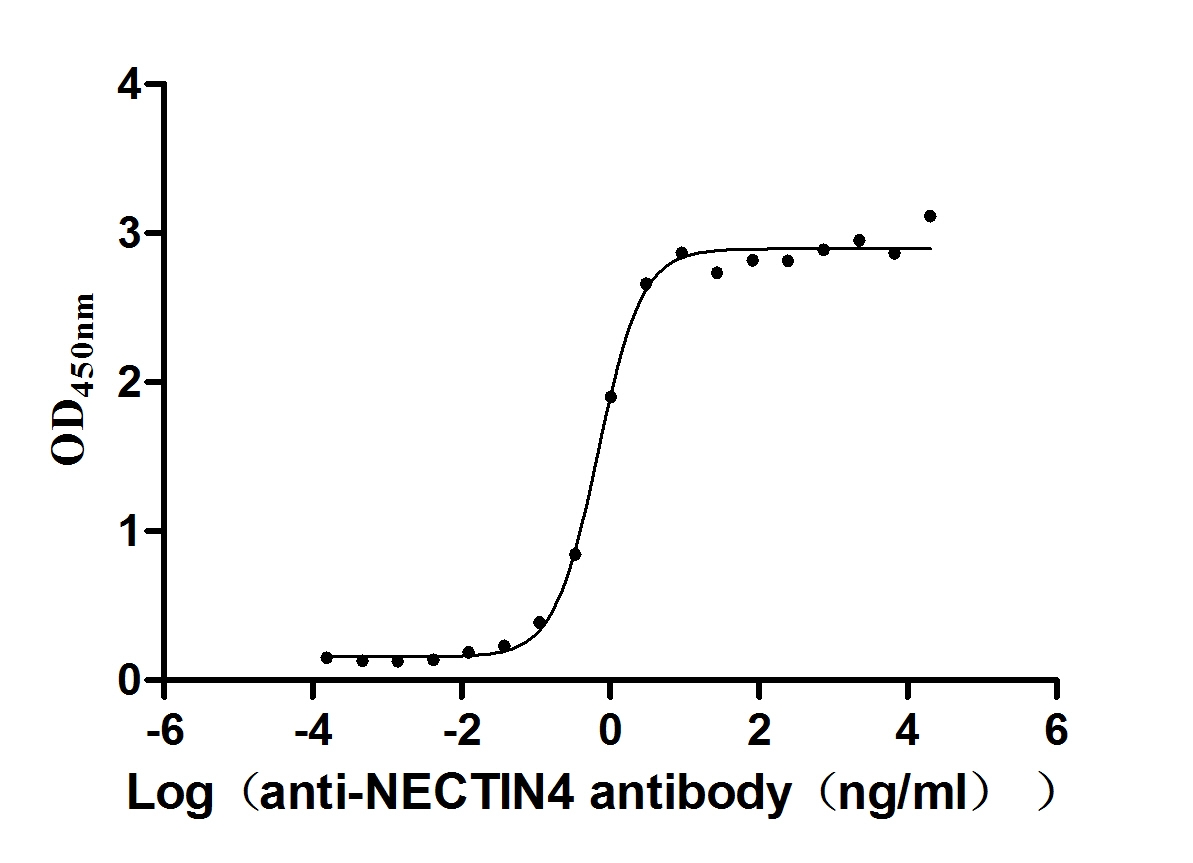
-AC1.jpg)
